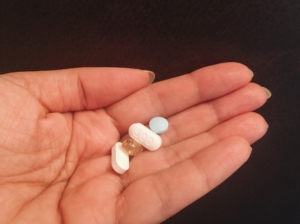Should Older Adults take Vitamins?
Vitamins are an interesting topic in the field of nutrition. Some people feel strongly about taking them, whereas others are wary of their effectiveness. I feel that the need for vitamins should be determined on an individual level. It’s important to speak to your doctor and a registered dietitian before taking any vitamins in order to determine which ones may be beneficial for you. According to the National Institute of Health, older adults and seniors may need more of certain vitamins and minerals compared to younger adults. For this age group, your doctor or registered dietitian may recommend taking a multivitamin or individual vitamins, such as those discussed below.

Which Vitamins should Seniors Take?
How much Calcium do seniors need?
Calcium works collaboratively with vitamin D in the body to help keep bones strong at all stages of life. As people age, they gradually lose bone density, which can lead to bone fractures in older adults. Older adults, specifically women, are at an increased risk of developing osteoporosis, a condition involving a significant loss of bone density, making them weak and brittle. Calcium is most abundant in milk, with an 8 ounc glass profiding 300 mg. Yogurt (3/4 cup) also provides about 300 mg. Soy cheese (1 oz.), Tofu (3.5 oz.) and white beans (1/2 cup) provide from 0-200 mg. per serving. Unfortunately, Ice cream only provide 85 mg. According to the Academy of Nutrition and Dietetics, older adults 51-70 years old should strive for 1000 mg. of calcium daily. Seniors aged 71 and older should strive for 1200 mg. daily.
How much Vitamin D do seniors need?
As people age, they no longer convert vitamin D from sunlight as efficiently. As previously mentioned, vitamin D plays an important role in the creation and maintenance of bones.This vitamin also increases the intestinal absorption of calcium. According to Harvard University, Many people in the United States consume less than the recommended amounts of vitamin D. Older adults who struggle with mobility and/or spend the majority of their time indoors are at an increased risk for vitamin D deficiency. Very few foods naturally contain vitamin D. Milk is fortified with about 115 IU of vitamin D per 8 ounce glass. 1 tablespoon of Cod Liver oil contains abut 1360 IU. The recommended daily intake of Vitamin D is 600 IU (15 mcg.) for seniors aged 51-70. Seniors 70 years old or older should strive for 800 IU (20 mcg.) daily.
Is vitamin Vitamin B6, or Pyridoxine, important for seniors?
Vitamin B6, or Pyridoxine, plays a role in protein metabolism, immune function, and the formation of red blood cells. Inadequate vitamin B6 status is typically associated with low concentrations of other B-complex vitamins in the body, such as vitamin B12 and folic acid. Certain groups of individuals are at risk of vitamin B6 inadequacy, including those with impaired kidney function and those with alcohol dependence. It has been hypothesized that poor vitamin B6 status is associated with the cognitive decline that some older adults experience, but more research needs to be done to determine the validity of this potential relationship. According to the accademy of nutrition and dietetics, adult males over the age of 51 should strive for 1.7 mg. per day. Women over 51 years old should strive for 1.5 mg.
Why is Vitamin B12 important for seniors?
Vitamin B12 helps to keep red blood cells and nerves healthy. Older adults need the same amount of Vitamin B12 as younger adults. However, according to National Institute of Health, they may have difficulty absorbing the vitamin from food sources. Additionally, vegetarians and vegans are at an increased risk of developing a vitamin B12 deficiency because it’s only naturally found in animal products. Seniors may also take medications such as antacids and Metformin for diabetes that my inhibit adequate absorptions.
So, what is the most important vitamin for seniors?
While determining if seniors should take vitamins. It’s important to know that a registered dietitian or doctor should investigate which vitamins are most important for you. However, this often gets overlooked at annual physician appointments. To help cover your basis until you can see a registered dietitian, a quality multivitamins is often the best place to start. We always recommend a quality vitamin from a healthcare provider.
Now that you’ve learned about some important vitamins and minerals for seniors, why not click on over to the 7 most important vitamins most Americans need? Or want to learn more about Vitamin D Deficiency? If so, click here.




